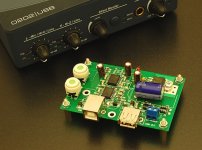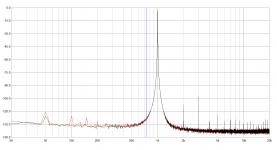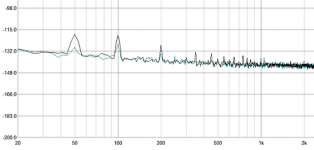Some time ago I designed a USB isolator, with ADUM4160 as the base of the project, for my sound card measurement system . I also added a dedicated power supply and, to make it more universal, isolated DC/DC converter (ADUM5000). ADUM4160 supports 12Mbps communication which is sufficient for 96kHz/24bit sampling rate.
Isolator works very well. Red line represents the measurement of the EMU soundcard connected directly to the USB port of my laptop and black using isolator. As you can see 50Hz hum and the second harmonic is filtered better. There is also less noise in the 2kHz - 20kHz band.
Isolator works very well. Red line represents the measurement of the EMU soundcard connected directly to the USB port of my laptop and black using isolator. As you can see 50Hz hum and the second harmonic is filtered better. There is also less noise in the 2kHz - 20kHz band.
Attachments
I've used this USB Isolator Board from Circuits@Home for a few months now and it works great. You can really hear the improvement in the audio quality as the USB-borne noise is stripped off. It uses the ADUM4160 also:
USB Interfaces « Circuits@Home
USB Interfaces « Circuits@Home
Nice!
I've had both these IC's for a couple years now and still haven't attempted to make a board. Do you plan on selling PCB's?
If there will be a few people interested I see no problem in doing more PCB's.
The next version will be smaller (without switches - I used them only for testing).
If there will be a few people interested I see no problem in doing more PCB's.
The next version will be smaller (without switches - I used them only for testing).
Well, count me in.
I still might keep the dream alive of building my own design some day. I would like a version that is as small as possible without any provisions for external power.
is allready there, with PSU isolator included.
It works fine, i have one. But does not work above 88,2 Khz
USB Isolator, Galvanic Isolated USB 2.0 - Electronics-shop.dk
It works fine, i have one. But does not work above 88,2 Khz
USB Isolator, Galvanic Isolated USB 2.0 - Electronics-shop.dk
For me, how would the "50Hz hum" on USB digital connection getting into the DAC is a magical mistery...You can really hear the improvement in the audio quality as the USB-borne noise is stripped off.
More useless stuff.
For me, how would the "50Hz hum" on USB digital connection getting into the DAC is a magical mistery...
More useless stuff.
Remember that all devices (computer → USB → DAC) share the same ground which causes flow of small currents, and these can cause the appearance of distortions in the analog part of DAC.
Hmmm... NO. Digital levels are way higher than those "noises", therefore are immune. You are thinking in analog terms.
Also FYI, currents CANNOT flow on just ONE conductor. They need a return path to source, a closed circuit.
In my opinion you should look at the problem more globally. All devices in this circuit have something in common - AC power sockets
Attachments
It works fine, i have one. But does not work above 88,2 Khz
That's when the flux capacitor kicks in. It's too bad that the device disappears, but at least the Libyans won't get it.
Attachments
In my opinion you should look at the problem more globally. All devices in this circuit have something in common - AC power socketsLook at attached figure - do you really think that isolation doesn't give any benefits?
I don't understand the figure. Supposed to be what? What did you use to measure the -132dB noise? Or is just a a simulating software?
If you have AC noise on SPDIF inputs, it will be common mode noise - rejected anyway below noise floor by the rest of devices.
Hmmm... NO. Digital levels are way higher than those "noises", therefore are immune. You are thinking in analog terms.
Also FYI, currents CANNOT flow on just ONE conductor. They need a return path to source, a closed circuit.
I am using a laptop into a battery powered USB dac (USB9023). The USB port 5V pin is floating. Am I right in thinking that I cannot benefit from a USB isolator as there is no ground loop between the laptop and the dac?
TIA
Giulio
@Giulio - yes, you have in commun only the ground (from power side) and SPDIF signal. There is no way the noise from your power supply can get to the DAC. You can have other sources of errors (jitter), but power supply is not on eof them.
PS: The fact that you are running the laptop from battery does NOT influence the end result. You have internally all kinds of switched-mode power supply to convert that battery voltage to the numerous voltages needed.
PS: The fact that you are running the laptop from battery does NOT influence the end result. You have internally all kinds of switched-mode power supply to convert that battery voltage to the numerous voltages needed.
Sonic, you really should not give opinions about that which you have little experience. I can tell you from ACTUAL LISTENING that power supply & ground quality absolutely affect the sound of a dac that's connected to the usb interface, or even to a wifi wireless interface(SB Duet, etc.). Whether or not one can measure the difference, myself & others I know, and many more I don't, reliably in a/b testing, even blind testing, hear differences when even a single capacitor is changed on even the 5V main supply line of the interface. Computers, and indeed the USB/wifi interfaces themselves, produce prodigious amounts of noise that is inflicted upon the supply rails & grounds, and properly cleaning up these lines reduces jitter(timing jitter and that caused by spdif waveform distortions), and thus improves the sound from the connected dac. Refusing to hear what you cannot measure does not make a problem non-existent. Thinking like this is how companies like Yamaha produced, for example, power amps with near perfect measurements that sounded absolutely terrible. If you can't measure a problem that you hear, you simply have not invented the right way to measure it.
PS: The fact that you are running the laptop from battery does NOT influence the end result. You have internally all kinds of switched-mode power supply to convert that battery voltage to the numerous voltages needed.
SoNic - have you learned about the difference between common-mode and differential-mode noise? From what you've just written the answer looks to be a resounding 'no' because you seem to think that CM noise 'gets rejected'. What leads you to this view?
- Status
- This old topic is closed. If you want to reopen this topic, contact a moderator using the "Report Post" button.
- Home
- Source & Line
- Digital Source
- USB digital isolator for audio DACs



